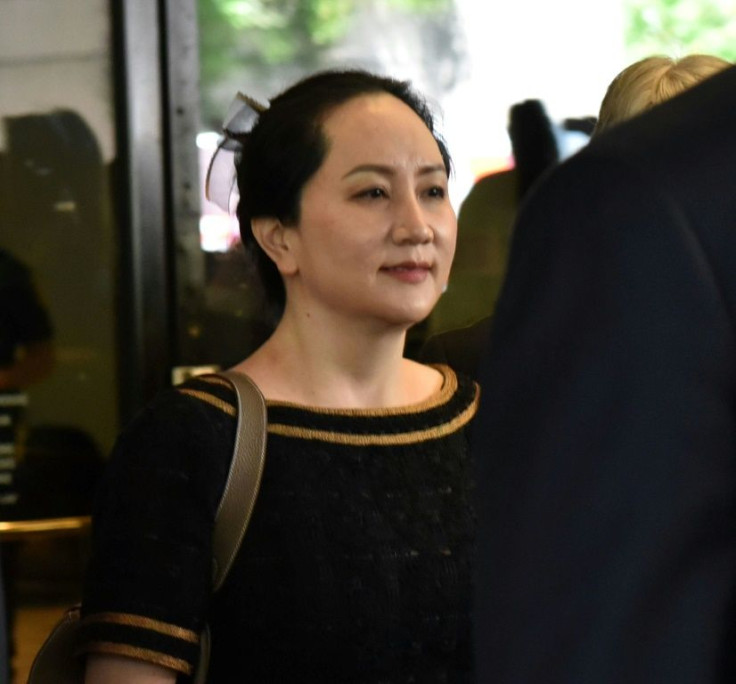Huawei Exec To Accuse US Of Misleading Canada In Extradition Case
Chinese Huawei executive Meng Wanzhou and her lawyers return to a Canadian court on Monday to press for her release, arguing the US misled Canada about her alleged crimes to secure her detention on foreign soil.
The defense, according to court filings, will say that the crux of the US charges against Meng -- that she hid Huawei's relationship with former subsidiary Skycom in Iran from HSBC bank -- is false and lacks context.
"Putting such a misleading and incomplete record before this court disqualifies it from continuing these proceedings," the document said.
The Chinese telecom giant's chief financial officer was arrested on a US warrant in December 2018 during a stopover in Vancouver.
She is charged with bank fraud linked to violations of US sanctions against Iran, and has been fighting extradition ever since.
The case, meanwhile, has added to severe strain in Sino-US ties and created an unprecedented rift between Canada and China.
Nine days after Meng's arrest, China detained former Canadian diplomat Michael Kovrig and businessman Michael Spavor in what is widely viewed as retaliation over Meng.
Espionage charges were filed against the pair in June, soon after Meng's first legal setback, when her bid to have the case thrown out was defeated.
The past nearly two years of sporadic court appearances have so far seen Meng's attorneys trade barbs with Canadian government lawyers over access to classified documents.
The defense also accused US and Canadian authorities of having conspired to gather evidence and interrogate Meng without a lawyer in the hours after she disembarked from a Hong Kong flight but before she was charged, in violation of her rights.
The RCMP, they noted, provided serial numbers and technical specifications of her smartphones, tablet and laptop computer to the FBI.
"The Attorney General of Canada doesn't accept there was any conspiracy to deprive Ms. Meng of her rights," Crown counsel Robert Frater shot back in July.
"We do not accept there was any violation of Ms. Meng's rights," he said.

Despite the Covid-19 outbreak's disruptions of trials at the British Columbia Supreme Court, Meng's case has proceeded by teleconference -- though at a slow pace.
At her last hearing in mid-August, however, her lawyers said they expected her to appear in person Monday for the first time in months.
US indictments allege that Meng and the world's largest telecoms equipment manufacturer conducted business in Iran in violation of US sanctions through Skycom.
The US Justice Department says the Hong Kong-registered firm was a poorly disguised Huawei front company.
They note that Skycom employees had Huawei email addresses and badges, and that Skycom's leadership were Huawei employees -- including Meng, who has admitted to serving previously on its board.
Huawei also at one point owned a stake in Skycom but sold its shares to another company that the US says also was controlled by Huawei.
The US alleges Meng fraudulently concealed all this from HSBC, putting the bank at risk of unknowingly violating Iran sanctions.
It pointed to a presentation Meng made in 2013 to an HSBC executive after the British banking group, worried over potential Iran exposure, requested an explanation.
But Meng insists she was upfront with the HSBC executive at the Hong Kong tea house meeting.
The 48-year-old daughter of Huawei founder Ren Zhengfei has said Skycom was merely a "business partner" in Iran and that Huawei's dealings there did not violate global standards or US law.
The company has rejected as "unfounded" these and additional charges filed in February accusing Huawei of stealing technologies from US companies.
US officials claim Huawei poses a security risk because of its links to China's government, while Beijing has accused Washington of seeking to crush Huawei.
Meng remains under house arrest in Vancouver while the extradition case, which is due to wrap up in March or April 2021, is heard.
© Copyright AFP {{Year}}. All rights reserved.





















